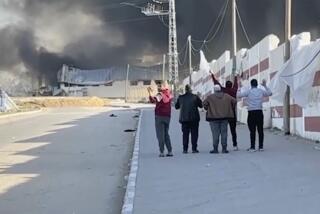Troops kill Afghan cleric
- Share via
KABUL, AFGHANISTAN — Western troops traveling through the capital of Afghanistan in a military convoy Thursday shot dead an Islamic cleric, apparently mistaking him for a would-be suicide bomber, officials and witnesses said.
NATO acknowledged that its forces had fired on what appeared to be a “threatening vehicle,” and expressed regret for the death. Afghan police said two of the cleric’s children were in the car with him but were not hurt.
The incident took place hours before Afghan President Hamid Karzai, speaking to a major security conference in London, urged that greater care be taken when foreign troops come in contact with civilians.
The fatal shooting took place during the morning rush hour close to a U.S. military base on the city’s eastern edge that had been the scene of a suicide car bombing two days earlier. Eight Western troops and at least half a dozen Afghan civilians were injured in that blast, outside an installation known as Camp Phoenix.
After the shooting, protesters staged a small but angry demonstration near the gates of the base, blocking traffic and shouting anti-American slogans.
The victim was identified by authorities as Mullah Mohammad Yunus, an imam, or mosque preacher. Relatives said he was on his way to a nearby madrasa, or religious school, at the time of the shooting.
The nationality of the Western troops involved was not immediately released.
Sayed Abdul Saebzada, chief of the criminal investigations department of the Kabul police, described the incident as a “misunderstanding.”
Afghan motorists usually give a wide berth to military convoys, but drivers sometimes accidentally stray too close. Western troops are trained to use nonlethal means such as warning shots to try to distinguish a careless driver from an attacker.
Witnesses said the cleric’s car was struck by multiple rounds fired from the convoy.
“I think the military men thought this might be a suicide bomber,” said a 24-year-old neighborhood resident named Enayat.
A recent United Nations report found that although war-related Afghan civilian deaths climbed last year to more than 2,400, the highest level since the start of the conflict in 2001, Western forces were responsible for a much smaller proportion of them than in previous years. The report said insurgents caused nearly three-quarters of the civilian fatalities, and foreign and Afghan forces the remainder.
The decrease came after U.S. Army Gen. Stanley A. McChrystal, who commands all Western forces in Afghanistan, implemented strict new rules of engagement meant to protect civilian lives.
Even so, civilian casualties remain one of the most inflammatory issues between the Karzai government and the Western military. Noncombatant deaths often trigger large-scale anti-American and anti-Western protests, even when culpability is not entirely clear.
To counter some of that anger, military officials issue swift apologies when indications are that Western troops were at fault.
“I express my sincere regrets for this loss of life and convey my deepest condolences to [Yunus’] family,” Canadian Brig. Gen. Eric Tremblay, chief spokesman for NATO’s International Security Assistance Force, said in a statement issued hours after the killing.
He said the slain man’s relatives would receive financial compensation.
Karzai, speaking at the London conference, called on Western troops to refrain from taking part in nighttime raids on suspected insurgents. Such raids have been responsible for a spate of recent deaths, and have given rise to conflicting claims as to whether those killed were insurgents or civilians.
The Afghan leader said nighttime operations in populated areas should be carried out solely by Afghan forces, and “in concert with Afghan laws.”
--
Special correspondent Aimal Yaqubi contributed to this report.
More to Read
Sign up for Essential California
The most important California stories and recommendations in your inbox every morning.
You may occasionally receive promotional content from the Los Angeles Times.













